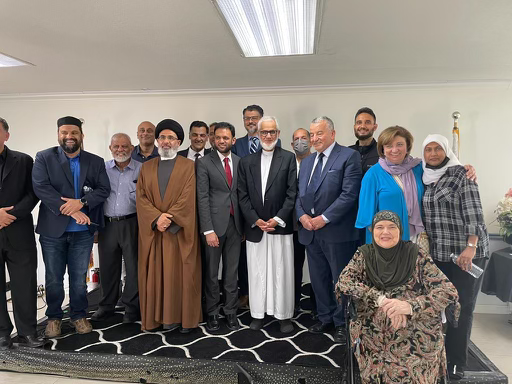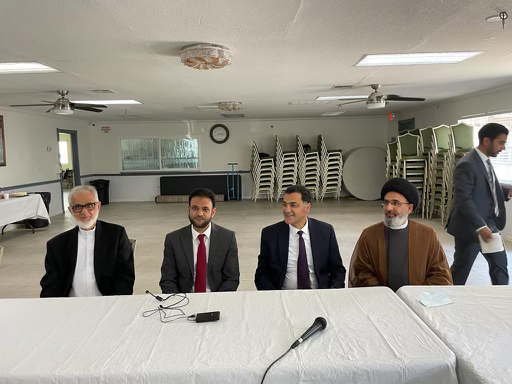By: Salam Al-Marayati, MPAC President

“And thus have We willed you to be a community of the middle way, so that [with your lives] you might bear witness to the truth before all mankind, and that the Apostle might bear witness to it before you.” (Quran 2:143)
The Quran was revealed to us over 1400 years ago and one of its unfailing attributes is that with each passing decade, century or millenia, its wisdom never ceases to be prescient.
The verse above is perhaps the perfect example. That Quranic wisdom is perhaps more applicable today than it was upon its revelation.
It presents us with a challenge as it relates to current social issues:
Can one, based on faith, be opposed to abortion but still be pro-choice?
Can one support strong security policies for our country while defending civil liberties?
Can one demand gun control while supporting the 2nd Amendment?
The answer to all these questions is a resounding yes but the repercussions of taking such stands have costs — usually mockery or ire or intimidation by the extremes.
The middle-way approach is actually part of MPAC’s philosophy.
Given that approach, I’d like to share our work this week.
Meeting with Vice-President Kamala Harris
The Quranic principle for moderation was applied this week in several important engagements with government officials. On Monday, our former Communications Director, Edina Lekovic, in her personal capacity, delivered a message to Vice President Kamala Harris in a roundtable on faith perspectives regarding reproductive rights.
The message was based on a letter drafted by Islamic legal scholar Asifa Qureshi. It argued that all Americans must be concerned with the political shift on social issues that is eroding the wall of separation between church and state. It was signed by Muslim Advocates, KARAMAH: Muslim Women Lawyers for Human Rights, HEART Women and Girls, American Muslim Bar Association, Muslim Wellness Foundation, American Muslim Health Professionals, and Muslim Public Affairs Council.
In short, the government should never be in the business of telling us what religious view we should or should not adopt and it should not compromise the health of any woman in any choice involving reproductive rights.
First National American Muslim Policy Conference
Then on Tuesday, we had the inaugural National American Muslim Policy Conference. It was at MPAC’s DC office, just a few blocks from the White House, and was co-sponsored by American Muslim Health Professionals, ISPU, EMGAGE, Illinois Muslim Civic Coalition, and MPAC. The five organizations have come together to form the Community Collaborative Initiative, a community-based action research project hosted by Indiana University’s Lilly School of Philanthropy.
We covered the imperative for civic engagement in Islam, polling on anti-Muslim animus in the US, health security advocacy, countering white supremacist violence, and human rights. Speakers included Peter Beinart, Samar Ali, Acting Assistant Secretary for Counter Terrorism and Threat Prevention Samantha Vinograd, Diala Shamas, and Deputy National Security Advisor Jonathan Finer. You can view the video of the conference here.
Discussion with Secretary of Homeland Security Alejandro Mayorkas
I ended the week with a roundtable discussion held by Secretary of Homeland Security, Alejandro Mayorkas. It was with various faith leaders and centered around the threat of “domestic violent extremism.”
I put that in quotes because it is a misnomer.
There is nothing domestic about terrorists who invoke a conspiracy theory about white genocide in France and then kill African Americans in Buffalo or Latinos in El Paso.
There is nothing domestic about anyone who invokes the New Zealand massacre of Muslims at Friday Prayer and kills Jews in Poway or fire bombs a mosque in Escondido.
All domestic means is that they are white nationalists while foreign terrorism is usually designated for Muslim extremists even if they were born in the US. That is the tip of the iceberg regarding double standards in our national security policies.
In any case, we need to take the threat seriously and all efforts must be exhausted — mental health, public health, social services, law enforcement — to counter this form of violent extremism.
Meeting with Ambassador Rashad Hussain, Religious Freedom at the U.S. State Department


Finally, we held a meeting with Ambassador Rashad Hussain, the President’s choice to run International Religious Freedom at the US State Department. It was a great discussion hosted by Dr. Muzzamil Siddiqui, a giant in Islamic thought and institutional work in America. Ambassador Hussain explained the essentials for effective advocacy for religious freedom and the priorities he is facing. One of the issues involved Indian Muslims, and the Secretary of State, Anthony Blinken, made it a priority to single out the Modi regime for creating a dangerous environment where Muslims in India can face genocide by right-wing Hindutva thugs throughout the country. We discussed much more but in short, it was a great exercise in civic engagement.
One of our goals is to strengthen American Pluralism by improving public understanding and policies that impact American Muslims. As we mentioned earlier, to do so we believe a middle-way approach is part of MPAC’s philosophy.
All can be done while preserving the integrity of our Constitution.
It is actually the only way to achieve success.
Otherwise, in the words of Benjamin Franklin, those who sacrifice civil liberties for temporary security deserve neither.
Invest in MPAC’s work to improve public policies and perceptions. We’re changing how America views Islam and Muslims.